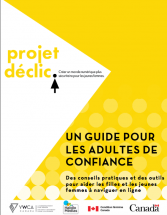Un guide visant à outiller enseignants, parents et intervenants afin de mieux aider et comprendre ce que certaines filles vivent en ligne vient de paraître. Un outil précieux à découvrir.
Dans le cadre du Projet déclic, la YWCA, en collaboration avec Habilomédias, a mis sur pied un guide qui vise à créer un monde en ligne plus sécuritaire pour les filles. Un guide pour les adultes de confiance : des conseils pratiques et des outils pour aider les filles et les jeunes femmes à naviguer en ligne est destiné aux adultes significatifs dans la vie des adolescentes, notamment les enseignants.
Ainsi bien outillés et renseignés, les enseignants pourront aider les filles à mieux naviguer en ligne et prévenir la cyberviolence.
Qu’est-ce que la cyberviolence?
La cyberviolence désigne « tout acte dommageable commis par l’intermédiaire d’une technologie réseautée. » (Source : Guide pour les adultes de confiance, p. 5.). On parle donc de cyberintimidation et d’atteinte à la vie privée en harcelant ou en traquant une personne par l’intermédiaire des médias sociaux, textos, courriels ou applications en ligne.
Les bonnes et mauvaises façons de soutenir les filles

Ensuite, les bonnes pratiques à adopter sont abordées. En tant qu’enseignant, il est important d’écouter l’adolescente qui se confie à vous. Il est utile de connaître les plateformes et sites où peut survenir du harcèlement. Les actions à poser face au harcèlement fait par un inconnu ou par un pair sont alors différentes et dépendent du contexte.
On y explique aussi comment recueillir des preuves de harcèlement et comment signaler les cas de cyberintimidation, soit, par exemple, en avisant les centres de sécurité des différentes plateformes de médias sociaux, en bloquant l’inconnu fautif, en rapportant le cas à l’école ou en faisant un signalement à la police. Les rôles, les droits et les responsabilités de chacun sont expliqués ainsi que les conséquences criminelles qui peuvent survenir.
Les relations en ligne
Les relations en ligne amènent des problématiques qui pourront inquiéter les adolescentes et les amener à se poser des questions sur les façons de se comporter en ligne. Le guide propose des façons d’accompagner les filles dans leur gestion des conflits avec leurs amis virtuels et explique les notions de sextage, flirt en ligne, sextos, partage de photos et bien d’autres. En étant informés, les adultes de confiance aident à prévenir les problèmes.
La prévention en classe
La prévention s’effectue autant à la maison qu’en classe ou dans d’autres lieux de socialisation. Le guide suggère d’aborder les questions de sexisme et des relations interpersonnelles dans les médias avec les adolescentes et de donner le bon exemple en demandant préalablement l’autorisation avant de publier une photo sur le Web. La sensibilisation peut se faire en classe par l’intermédiaire d’activités qui favorisent l’esprit critique et le respect des filles.
Pour aider les enseignants, une liste de questions visant à susciter la discussion est proposée à la fin du guide. Ces déclencheurs de conversation permettront de voir si les adolescentes sont bien informées et outillées en matière de cyberintimidation et si elles adoptent de bonnes pratiques virtuelles.
Un guide pour les adultes de confiance est donc un outil précieux pour tous les adultes de confiance qui côtoient des adolescentes. L’enseignant, comme le parent ou l’intervenant, pourra être mieux en mesure d’aider et de comprendre ce que certaines filles vivent en ligne.




 Recevez l'Info #DevProf et l'Hebdo pour ne rien manquer des nouveautés de l'École branchée!
Recevez l'Info #DevProf et l'Hebdo pour ne rien manquer des nouveautés de l'École branchée!




